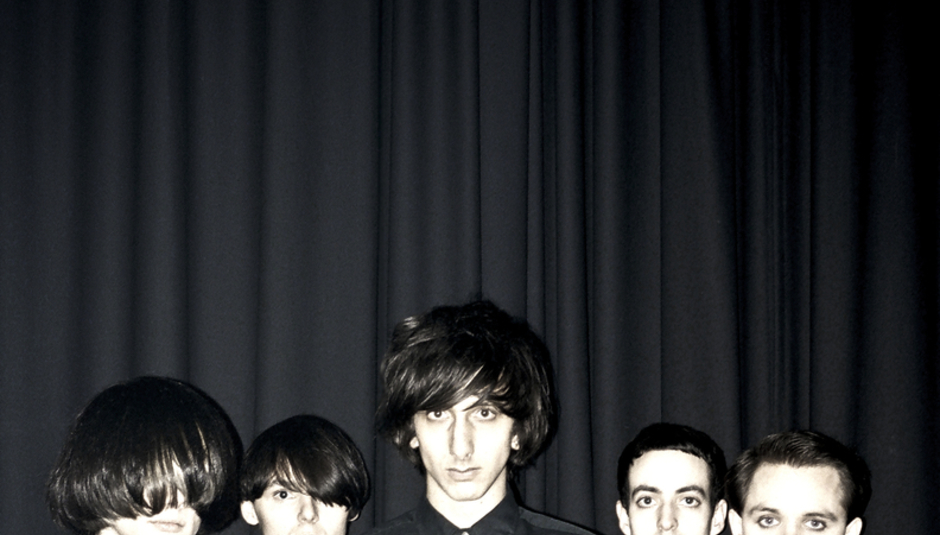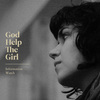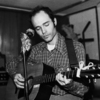Like unexpectedly witnessing the rebirth of five black-clad phoenixes, the second coming of The Horrors has caught many off guard. In the wake of their mini-kraut epic ‘Sea Within a Sea’, the band’s second album, Primary Colours, has enjoyed unprecedented levels of praise from nearly every corner of the critical sphere.
For a band once viewed by many as just another forgettable morsel chewed up and spat out by the hype machine, the usually sombre Horrors must certainly be smiling with the album’s release this week.
With our journalistic curiosity piqued, DiS recently picked up a phone and rang the band’s Tom Cowan (aka: Tomethy Furse) in order to shed some light onto what lies behind those dark exteriors.
DiS: So what happened between albums one and two?
TC: I don’t think there’s one specific event that happened. It was just the natural progression of the last couple of years, the music that we had been listening to in the last couple of years and also the acquisition of a lot of the machines and technology that we were using.
What music were you listening to?
All sorts. Detroit techno, the really early stuff. Underground hip hop, like Madlib and J Dilla. All kinds of stuff. I could go on. There was no specific event that happened. I don’t think you can pinpoint what happened. It was always there. We just needed a bit more time.
You ended up in a studio space in Stoke Newington, right?
Yeah, we ended up writing.
You didn’t drop off the radar exactly, but was it important for the band to retreat into your own space like that?
Well yeah. We toured the first record for ages and, you know, all the time we were touring that record all we wanted to do was go and record some more. That was kind of frustrating. We knew that what we were doing wasn’t… it wasn’t really as good as we wanted it to be. But we didn’t have anytime to write music. We’re not the kind of band to sit around on the bus with acoustic guitars. We need to be in a studio to work really. As soon as we got on tour, you know, we just started finding rooms and writing. In between that, you know, we got dropped but then we got picked up pretty quickly again and there was so much stuff that stopped us from getting this record out quickly. But it was a good thing actually. I think the majority of this record that made it onto the final cut was all done in the last six months of writing, possibly even the last three or four months of writing.
So you were in a windowless, insular space writing away?
There are no rehearsal studios that have windows, perhaps a couple. I think the point of that was more like we have this place that we’d shut ourselves off from the world. That was briefly our existence from morning to evening. Sometimes we wouldn’t leave for days and sometimes we’d only go in for a couple of hours. It was nice having our own space. Throbbing Gristle and Cabaret Voltaire, they also said, about their studios, how important their studios were to them.
It became your playground in a way?
Yeah, exactly.
Were you toying around with lots of different ideas or did you have an idea of the direction you wanted to go in?
Initially, we didn’t really have a specific idea. I think we all had our own little ideas and stuff we wanted to try out but there was no kind of, there was no set plan. And then we wrote ‘Three Decades.’ That was pretty early on when we wrote that and that kind of set the tone. We kind of knew that it was something quite special and that kind of set a tone for the rest of the songs that made it onto the record.
Were there any ideas that were too far out there, too extreme?
Not really. I think Geoff [Barrow], when he was producing the record, was actually stopping us from taking things a step too far.
That was my next question, did Geoff help you nail it down and rein you back on occasion?
We came to him with pretty much the record as it is now, just a rougher version. We were originally supposed to do it with Chris [Cunningham], but that didn’t work out because he had other commitments. Initially, you kind of think that Geoff would have brought an element of Portishead to it, to us, but I think actually his main role was just stopping us from taking what we did too far. He was really into the demos and he was constantly saying throughout the whole session, “You’ve got to capture this because this is special.”
He helped you to stand back from the songs in order to get some perspective?
Yeah. You can get lost in sounds. You can get lost in ideas a bit. He’s quite good at reining us back.
Were you ever worried that you might scare off your old fans?
To be honest, for me personally I was much happier... you know, if they were going to be scared off by that then I wouldn’t really want them to be our fans. I think being bold is a lot better than being safe and, you know, to my ears it’s infinitely better. I don’t know, I haven’t really thought about it that much.
There was never a worry about not selling enough records then?
Not really.
It’s more about being creative?
It is. Record sales are kind of irrelevant with a band like us. We’re not talking about millions anyway. It’s more about actually doing something that people are going to get into for a long time.
Would you say you’ve made a very British record?
I think we’re quite a British band. So yeah, I don’t think we could escape from it even if we wanted to. I think it’s full of British idiosyncrasies.
A lot of the press have been surprised by the new single and are writing about it being a shocking change of direction. Do you think it’s fair for it to be described like that?
The transition between the two for us was a slow and gradual one. To other people it’s a sudden one. I can see why it would be seen like that. But I don’t know, I think press always has this habit of misunderstanding. From what I’ve read, I think they’ve just been watching the first couple of people talking about the single coming out. But then, what was said there was echoed throughout other press and to me it just looked like a lot of the press don’t know what they’re talking about and kind of look more to what other people have said. And then you kind of get this mish-mash of opinion and half-truth and quite ill informed opinion. For me, for us, it was a gradual thing and it was a long process and we wrote a lot of songs and eventually whittled it down to ten.
You really don’t let public opinion effect what the band does, do you?
No (laughs). I mean what’s the point? It’s painfully obvious when that happens. And public opinion is circulating anyway.
Do you feel like you received a fair ride from the press around the time of your first album?
I don’t think they understood it at all. I don’t think even the record company understood it. And that was kind of half the problem. You had people who didn’t understand. They saw it as a product, they were trying to sell a product they didn’t understand and that never really works out. It was frustrating for us because we were being portrayed as people we actually weren’t at all. We were having fun, we did take it all very seriously but it was kind of tongue in cheek and it got sold as a lot more cartoonish and a lot more silly and as a result people dismissed us rather off-handily. I mean the amount of people I’ve met who take about ten minutes to explain their surprise that we can actually talk intelligently about music. Or, you know, who can actually see that we’re passionate about what we do. That is frustrating.
Do you think you’ll be a bit more wary of the press this time?
Perhaps. I don’t know but I think actually maybe this record has set the record straight. There’s still going to be people who get it wrong and I think that there are people who are getting it a bit wrong. But I think the impression they’re getting generally is that we’re not the band they thought we were.
On the point of people who get things wrong, some people are making comments that your influences are still too apparent on this record. Do you think that’s a fair critique?
I think that music is in its nature derivative and that it’s impossible to get away from that. Originality is really only about how well you hide your influences. So I don’t know, we wear influences on our sleeves but we wear a lot better influences on our sleeves than most other bands. If people don’t like it, they’re going to pick up on the obvious thing that’s not to like. Before it was how we looked and they said that we couldn’t play and we showed them wrong that time. And now we’ll show them wrong again.
Video: The Horrors 'Who Can Say'
Do you get a thrill, as a band, challenging people?
I think it’s always interesting to challenge people. I don’t think we set out initially to challenge people. It just might be the kind of band that we are.
Do you feel like you’re finally playing the music you always wanted to play?
I am playing music that I really enjoy playing. I can’t imagine staying in one place for too long... I’d really like to get back to wearing the influences on your sleeve thing for a second. If you go back to like The Beatles ripping off black R&B bands, Little Richard; go to Kraftwerk stealing black funk beats and playing them electronically. That’s how music works. That’s how culture works. Fashion, literature, architecture, that’s how the human race works. Originality, I think, is something of a trick or maybe a slight of hand or is actually people being ignorant of where the music they think is really original came from.
A bit like that old adage that says genius steals from everyone?
Yeah. It does. There’s a fantastic Brazilian manifesto called The Cannibal Manifesto. It’s a call for Brazilians to absorb other people’s cultures in order to enrich their own. It completely sums up how art works. It doesn’t come from nowhere. It’s pretty much impossible for it to come from nowhere and if you think it comes from nowhere then you don’t know enough of where it’s been.
Have you been surprised by the positive reaction to the new album?
I think we kind of knew that it was a great album and I think there was a tiny nagging voice in the back of your head saying ‘What if no one really cares’. The reaction we got wasn’t unexpected, but it was nice. It was a nice confirmation.
Where else do you see the band heading?
Well, we’re going to tour this one and then we’ll see after that. I don’t think we have any specific ideas. I think the next time we’d actually set up a studio properly and just work on it ourselves and see where it goes. I imagine it would still be quite psychedelic. It would still be interesting. I can’t imagine us going country.
Website: thehorrors.co.uk
Read Charles' review of Primary Colours here and visit their DiS profile for more content here






















